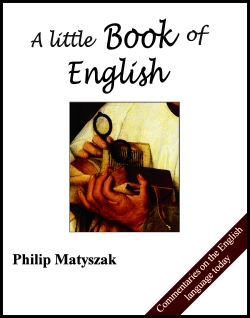|
The earlier Prof blog entries as well as some new articles are now available as a Kindle book from Amazon. We hope you enjoy it.

amazon.com amazon.co.uk
|
| 15 January 2021 | | You know this, don't you? | Most languages have what linguists call a 'question tail', and these are more common in spoken usage than in the written form. This is none too surprising as the speaker uses a question tail to continue a dialogue, usually by asking the listener to agree or disagree with whatever has just been said. In some languages - for example Polish, the tail asks if the previous statement is correct with 'prawda' the word for 'true'. ('This is a good thing, true?') Other languages such as Russian invite agreement with word 'yes?' as the question tail, while others - e.g. Spanish - challenge the listener with 'no?'. Still others - for example the Scots and Canadians - use a dedicated tail word, in both the example cases that word being 'eh?' (pronounced 'ay').
English of course has to be different in a complicated manner. For a start, English uses not one word in the question tag, but two. To create a question tag, one takes the auxiliary of the main verb in the main sentence, puts it in the opposite form and adds the subject pronoun. ('We do like English to be complicated, don't we?' or 'We don't like English to be simple, do we?')
Just to add to the fun, English use question tags as rhetorical devices that don't expect an answer - 'Ooh, you're a pretty baby, aren't you?' and to turn a statement into a genuine question. 'You remembered to lock the door, didn't you?' If you are uncertain which is which, listen to the intonation - genuine question tags have a rising intonation, rhetorical tags are falling. So if you meet an acquaintance on the street, you may remark 'It's a nice day, isn't it?' with a falling intonation, but if its your first day on holiday and you have not looked outside yet, you may ask an early-rising spouse 'It's a nice day, isn't it?' with a rising intonation because you really want to know.
Finally, because just being slightly complicated is not enough, English has a final 'challenge' question tag, which means that the speaker wants to take issue with something. With this tag, the auxiliary agrees with the auxiliary in the main sentence. 'I am wrong,aren't I?' suggests doubt and confusion. 'I'm wrong, am I?' suggests that the speaker is quite certain that he is right and is prepared to argue his case.
| | | | | 15 November 2020 | | Mad about Etymology | Recently there has been a push by the media to avoid using terms which stigmatize those suffering from problems with mental health. More particularly style books have been amended to avoid the use of the words 'bonkers', 'nuts' and 'crazy'. (It is perhaps not co-incidental that these changes in editorial technique come at the end of the presidency of Donald J. Trump, so the media feels less need to reach for these pejorative adjectives.)
Yet if the study of language teaches us one thing it's that when people want to say something, censoring the actual words they use simply creates space for new euphemisms which quickly come to replace the old. In fact, none of the words now being depreciated were originally descriptors for mental health issues. 'Nuts' had - and still has - a positive usage and when 'nuts' first went beyond things like acorns it was to describe any food considered a special treat. From this we got 'to go nuts', and things went downhill from there.
If you were 'bonkers' early on the 20th century, you were somewhat drunk - which is why something 'bonkers' had a certain disconnection from reality, and this in turn has led to the more common modern usage. Finally 'crazy' in the 16th century meant broken or cracked into irregular pieces, a sense we still use today with 'crazed glass' or 'crazy paving'.
Yet as these words have moved in one direction away from their origins, another word has made the journey in the opposite direction. 'Fond' when used by writers such as Shakespeare used to mean 'mad', but as also is the case with words such as 'quite', literally' or 'nice', overuse has diluted the original meaning, so now being 'fond' of something means you rather like it, instead of being um, nuts about it. | | | | | 15 September 2020 | | The sounds we make |
A young friend of mine was rather surprised to hear that 'meh' is a neologism less than two decades old. She had assumed that it had been around forever, as it's such an essential part of the teenage vocabulary. ('How was your date last night.' 'Well, kind of meh, you know.') As a way of expressing apathy, indifference, a lack of enthusiasm or some degree of of all three conditions the word is a splendid addition to the language.
It's also interesting to see how other short sounds expressing emotion are changing. In the twentieth century, the short expression of disgust - for example when the cat has been sick on the carpet - was 'Ugh!'. Today this has largely been replaced by 'Eeew!', with 'Ugh' now referring to an unsatisfactory situation. 'I have to stay at home this Saturday. Ugh.'
Likewise 'Wow!' used to be an expression of surprise at something wonderful.'Wow! A new bike!'. These days 'Wow' is more likely to be replaced by that reanimated word from the 1960s 'Cool!'. As with 'Ugh' we have not dispensed with 'Wow', but found it a new place in the language where it has become a way of expressing surprised disapproval- as in 'Wow. I can't believe you said that.'
And that's just the different sounds between English-speaking generations. There's a whole range of other short sounds in other languages and cultures which are worth exploring such as the Italian 'Beh' which indicates bemusement and resignation. 'Beh, he'll do it his own way I suppose.' Or the fact that while English speakers say 'atchoo' while sneezing, the Chinese go 'ya-chee!'
| | | | | 15 July 2020 | | The case for pronoun reform |
Even before they moved on to the front line of the gender wars, personal pronouns in English were a mess. It's a truism that English is illogical, but with personal pronouns English seems perversely determined to be as illogical as possible.
Let's start with 'I' - straightforward enough? Yet when I ask, 'Who is there?' You can either reply 'Me' or 'I am', because for some reason 'me' has replaced 'I' in declaratives without an auxiliary. ('Who wants ice cream?' -'Me' or 'I do'.) When we get to 'I' plural - that is, 'we', it gets even more confusing. Should I happen to declare, 'We are in trouble', does this mean you and I are in trouble, or that I and someone else are in trouble but not you, or are I, you, and some other people all in trouble? It has been shown that to properly sort out the different meanings of 'we' the language should actually have four different pronouns.
'You', is of course a notorious linguistic abomination, and has been ever since English ditched the perfectly functional second personal singular pronoun 'thee, thy, thine'. As a further demonstration of the mess, consider that we can only address a person in the plural. So the sentence 'You have left your bags behind' might refer to one person with several bags, or several persons with one bag each. On the other hand, because English does not have a non-gender specific third person, if I want to refer to a singular person of unknown gender I have to use a plural. 'Someone has left their bag behind.'
Likewise, for some reason neuter possessive determiners are seldom used. We can talk about a woman and 'those kids of hers' but not of a car and 'those wheels of its'. Also the lack of gender neutral pronouns is particularly frustrating to non-binary individuals who have created their own. So let's welcome 'ae', 'ey' and 'per' to the mix. Zie can hardly make pronouns more confusing than xem are already, so xyr might as well make verselfs at home. | | | | | 15 May 2020 | | Fun with Place Etymologies |
Finding the origins of words is a fascinating part of studying a language, and studying the origins of place names even more so. England (named after the Angles, a Germanic tribe) is interesting because so many parts can be reconstructed. 'Den' is a hill, 'don' is a valley, 'ham' is a farm or hall, 'ton' is a forest clearing and so on.
However, when we cross to the United States, the entire naming process becomes a glorious mess which beautifully demonstrates the diverse origins of the nation. Some places like Pasadena ('the place in the valley') come from native American languages. Chicago gets its name from the French mispronunciation of shikaawa – the native name for a pungent type of wild garlic.
Other towns have names transplanted from their native land. Boston, England is a relatively small town, and Oxford, Mississippi got its name because the locals changed it in the hope that this would get the state university located there (it did). Paris, Texas has been voted one of the state's best small towns.
Other names describe the local geography in the settlers' native tongue. Detroit ('the strait') was named by French settlers because of its location between two of the great lakes, and English geographical descriptions abound – think of Boulder, in Colorado as an example.
Some places get their names directly or indirectly from the classical education of early Americans. Philadelphia ('the city of brotherly love') is one such example, and Cicero in New York state is another. I'm particularly fond of Minneapolis, which combines the Sioux word for 'water' with the ancient Greek word for 'city'.
In the south-west, one only has to think of that famous complaint by an American redneck. 'Go to places like San Diego, San Jose or all the way up the San Fernando valley to Los Angeles, and almost everyone you meet is a Latino.'
| | | |
page 1 page 2 page 3 page 4 page 5 page 6 page 7 page 8 page 9 page 10 page 11 page 12 page 13 page 14 page 15 page 16 page 17 |
|
|

